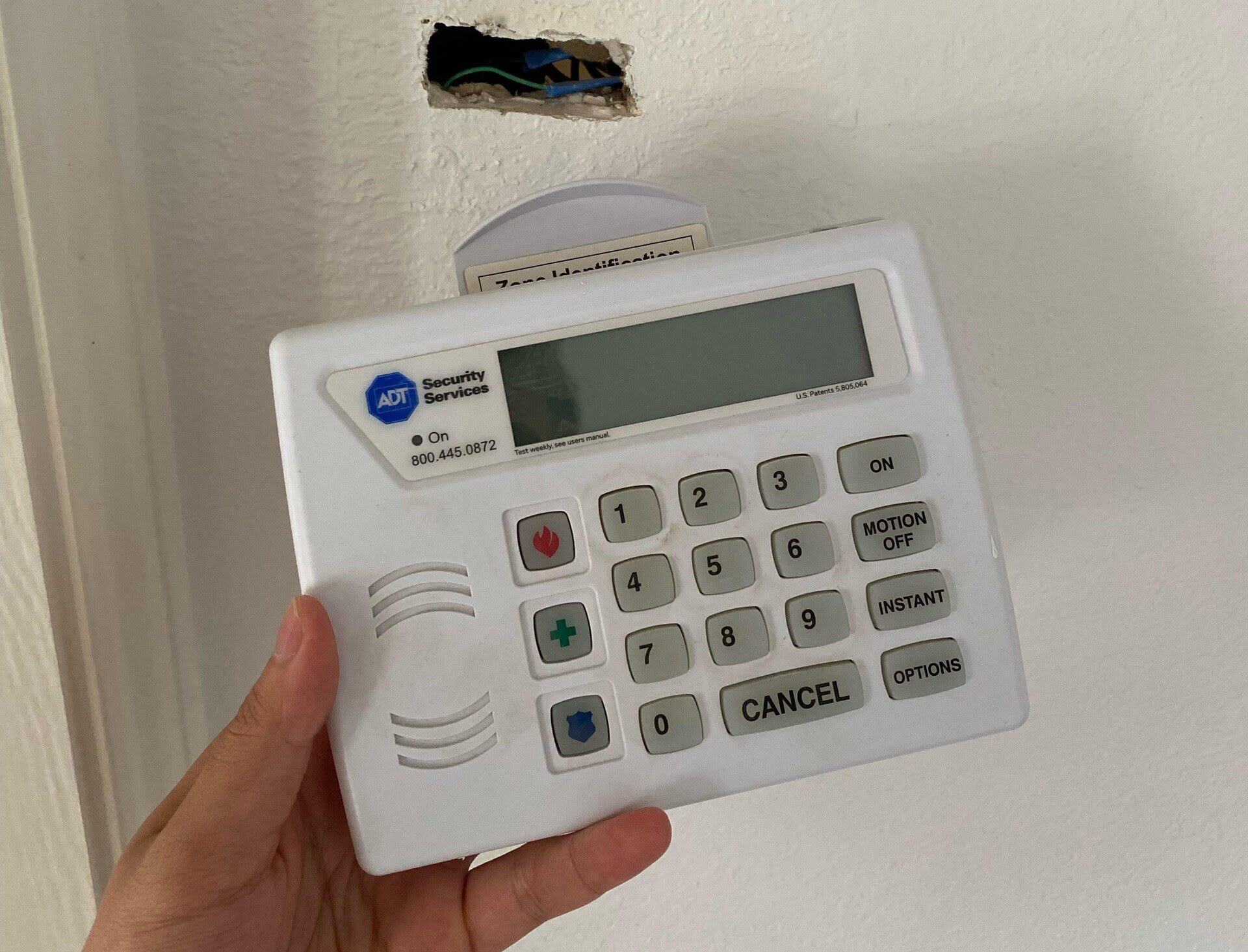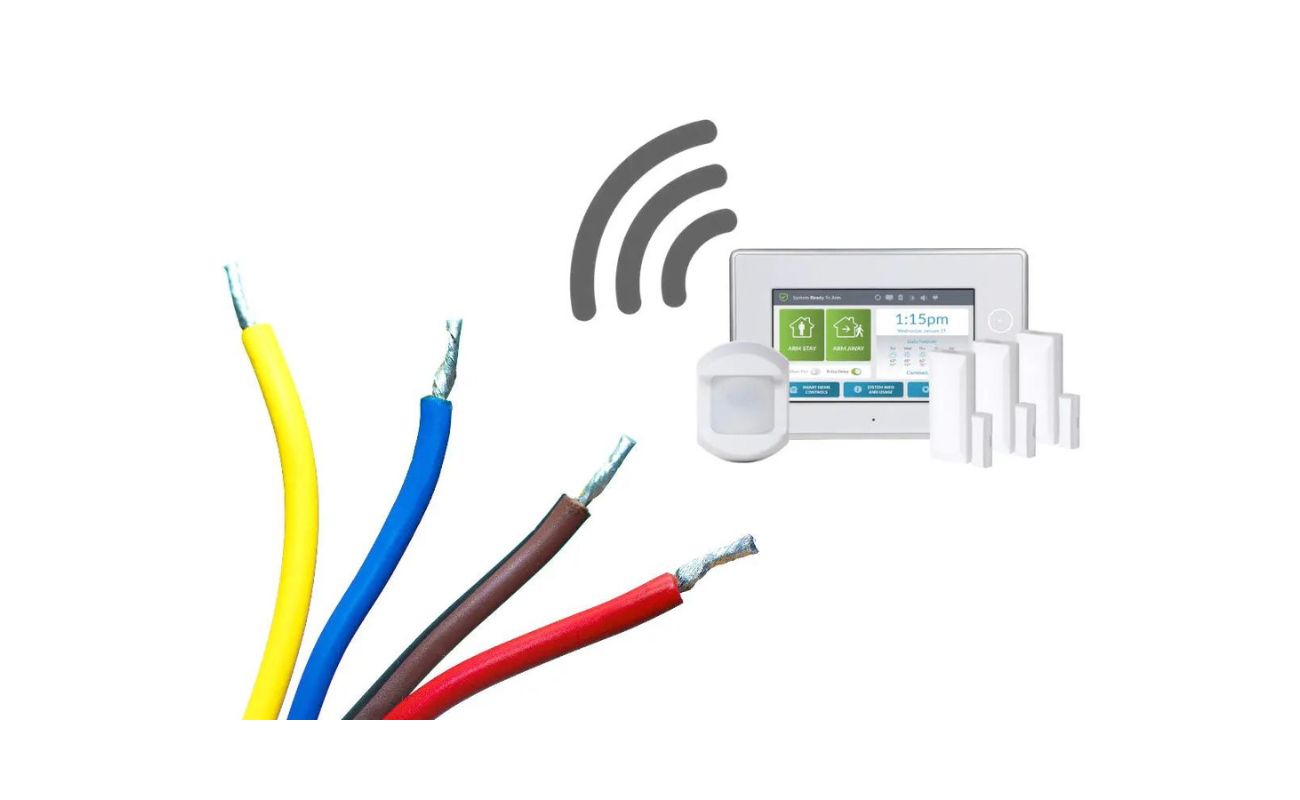Home>Home Security and Surveillance>Which Is Better: Wireless Or Hardwired Alarm Systems


Home Security and Surveillance
Which Is Better: Wireless Or Hardwired Alarm Systems
Modified: March 6, 2024
Discover the pros and cons of wireless and hardwired alarm systems for home security and surveillance. Make an informed choice to protect your property efficiently.
(Many of the links in this article redirect to a specific reviewed product. Your purchase of these products through affiliate links helps to generate commission for Storables.com, at no extra cost. Learn more)
Introduction
When it comes to home security and surveillance, one of the key decisions homeowners face is choosing between wireless and hardwired alarm systems. Both options offer their own set of advantages and limitations, and understanding the differences between them is crucial in making an informed decision.
A wireless alarm system utilizes radio frequency to communicate between the various components, such as sensors, control panels, and keypads. On the other hand, a hardwired alarm system relies on physical wiring connections to transmit signals and power the system. Each system type has unique characteristics that may make it more suitable for certain households and security needs.
In this article, we will explore the advantages and limitations of both wireless and hardwired alarm systems, as well as provide guidance on deciding which option is the better fit for your home.
Key Takeaways:
- Wireless alarm systems are easy to install, flexible, and scalable, making them ideal for homeowners and renters. However, they may have limitations in signal range and are vulnerable to interference from electronic devices.
- Hardwired alarm systems offer reliable signal transmission, long-term reliability, and enhanced security. They are suitable for homeowners prioritizing stability and durability, but they require a more complex installation process and have limited flexibility.
Read more: Which Is The Best Wireless Burglar Alarm
Wireless Alarm Systems
Wireless alarm systems have gained popularity in recent years due to their convenience and flexibility. Unlike hardwired systems, wireless alarm systems do not require extensive installation of wiring throughout the house. Instead, they rely on wireless technology to connect the various components.
The main advantage of wireless alarm systems is their ease of installation. Without the need for drilling holes and running cables, the installation process is simpler and less invasive. This makes wireless systems suitable for both homeowners and renters, as they can easily be installed and removed without causing property damage or leaving behind visible traces.
Another advantage of wireless alarm systems is their scalability. With a wireless system, new sensors or devices can be added or relocated without the need for additional wiring. This flexibility allows homeowners to customize their security setup as their needs change over time.
Wireless alarm systems also offer greater mobility. Since the components are not tethered to a central control panel, they can be easily moved around the house or even taken with you when you move. This makes them an ideal choice for those who frequently change residences or want the option to expand their security coverage beyond their primary residence.
Moreover, wireless alarm systems have advanced communication capabilities. The wireless technology used allows the components to communicate with each other and with a monitoring center via a cellular network. This means that even in the event of a power outage or a cut in the traditional landline connection, the system can still transmit signals and send alerts to the monitoring center.
However, wireless alarm systems do have some limitations. The signal range of wireless devices is restricted, especially in larger homes or homes with dense construction materials. This can result in signal interference or reduced reliability if the sensors are placed too far from the control panel.
In addition, wireless systems are vulnerable to interference from other electronic devices or radio signals. While modern wireless alarm systems incorporate encryption and frequency hopping techniques to minimize the risk of interference, it is still a potential concern.
Lastly, wireless alarm systems require a reliable power source. The batteries in the sensors and control panel need to be regularly checked and replaced to ensure system functionality. Failure to do so can result in a system failure or false alarms.
Despite these limitations, wireless alarm systems continue to be a popular choice for homeowners due to their easy installation, flexibility, and convenience. In the next section, we will explore the advantages and limitations of hardwired alarm systems to provide a comprehensive comparison.
Advantages of Wireless Alarm Systems
Wireless alarm systems offer several advantages that make them an appealing choice for homeowners seeking reliable and convenient security solutions.
- Easy installation: One of the main advantages of wireless alarm systems is their simple and hassle-free installation process. Without the need for complex wiring, homeowners can easily set up the system themselves or hire a professional installer to complete the task quickly and efficiently. This saves time, money, and minimizes disruption.
- Flexibility: Wireless alarm systems provide homeowners with the flexibility to place sensors and devices in various locations without the constraints of physical wiring. This allows for customization based on specific security needs and preferences. Whether you want to protect doors, windows, or specific areas of your home, wireless systems can accommodate your requirements.
- Scalability: Another advantage of wireless alarm systems is their scalability. As your security needs change or expand, it’s easy to add additional sensors and devices to your wireless system. Whether you’re adding a new room to your home or want to enhance security in your backyard, wireless systems can be easily expanded without the need for extensive rewiring.
- Mobility: Wireless alarm systems offer enhanced mobility compared to hardwired systems. As the sensors and devices are not tethered to physical connections, they can be easily moved and repositioned within your home. If you decide to move to a new house, you can easily uninstall and reinstall your wireless system without leaving behind any physical traces.
- Reliable communication: Wireless alarm systems utilize advanced wireless technology to ensure reliable communication between the various components. With secure wireless communication protocols and encryption techniques, the system can effectively transmit signals and alerts to the control panel and monitoring center. Even if there is a power outage or disruption in a landline connection, the wireless system can still function and provide protection.
Overall, wireless alarm systems provide the convenience, flexibility, and scalability that many homeowners desire. The ease of installation, along with the ability to customize and expand the system as needed, makes wireless systems a popular choice in the home security market.
In the next section, we will explore the limitations of wireless alarm systems to provide a well-rounded understanding of their capabilities.
Limitations of Wireless Alarm Systems
While wireless alarm systems offer numerous advantages, it’s important to be aware of their limitations before making a decision for your home security needs.
- Signal Range: Wireless alarm systems rely on radio frequency to transmit signals between the various components. However, the signal range can be limited, especially in larger homes or homes with walls and other obstacles that interfere with the wireless signal. This can result in signal loss or reduced reliability if the sensors are placed too far away from the control panel.
- Interference: Wireless alarm systems are subject to potential interference from other electronic devices, such as Wi-Fi routers, cordless phones, or even neighboring alarm systems that use similar frequencies. While modern wireless systems employ frequency hopping and encryption techniques to minimize interference, it’s still a consideration to keep in mind.
- Battery Dependence: Wireless alarm systems rely on batteries to power the sensors and control panel. It’s important to regularly check and replace these batteries to ensure the system functions properly. Failure to do so can result in system failure or false alarms. Homeowners should be vigilant and keep track of battery life to maintain the system’s reliability.
- Cost: Wireless alarm systems generally cost more than their hardwired counterparts. The technology and convenience they offer come at a higher price. Additionally, the need to replace batteries periodically can incur ongoing costs. However, the ease of installation and flexibility they provide may justify the higher initial investment for many homeowners.
- Compatibility: Not all wireless alarm systems are compatible with other smart home devices or automation systems. If integration with other home systems is important to you, make sure to check the compatibility of the wireless alarm system you are considering. Some wireless systems may require additional components or bridge devices to enable integration.
It’s crucial to weigh these limitations against the advantages of a wireless alarm system and determine if they align with your specific security needs and preferences. If you have a large home or anticipate potential interference issues, it may be worth considering a hardwired system instead.
In our next section, we will explore the advantages and limitations of hardwired alarm systems to provide a comprehensive comparison between the two options.
Hardwired Alarm Systems
Hardwired alarm systems have long been a reliable and popular choice for home security. These systems require physical wiring to connect the various components, including sensors, control panels, keypads, and sirens.
The main advantage of hardwired alarm systems is their robust and consistent signal transmission. Unlike wireless systems, which are susceptible to signal loss or interference, hardwired systems provide a stable and secure connection. With a direct and dedicated wiring infrastructure, these systems offer reliable communication between the components.
Another advantage of hardwired alarm systems is their long-term reliability. Once installed, these systems require minimal maintenance and have a longer lifespan compared to wireless systems. The absence of batteries means there is no need to replace them periodically, reducing ongoing costs and the risk of system failure due to dead batteries.
Hardwired alarm systems also provide a higher level of security. Since the components are physically connected, it is extremely difficult for intruders to tamper with or disable the system by cutting wires or tampering with wireless signals. This makes hardwired systems particularly suitable for high-security applications.
Additionally, hardwired alarm systems can integrate seamlessly with other home automation and smart devices. They can be connected to home security monitoring services, enabling quick and efficient response in case of emergencies. Integration with other home systems allows for advanced features such as remote control, real-time notifications, and integration with home surveillance cameras.
However, it’s important to consider the limitations of hardwired alarm systems as well. The installation process for hardwired systems is more complex and time-consuming compared to wireless systems. It involves running cables through walls and ceilings, which may require professional installation services.
Furthermore, the physical nature of hardwired systems limits their flexibility and mobility. Once the system is installed, it is challenging to reposition or expand it without significant modifications to the physical wiring. This can be a limitation for homeowners who anticipate changes in their security needs or who may move homes in the future.
Lastly, hardwired alarm systems may not be suitable for all properties. Older homes or buildings with limited access for wiring installation may pose challenges. In such cases, wireless alarm systems may be a more practical option.
In the next section, we will compare the advantages and limitations of wireless and hardwired alarm systems to help you make an informed decision for your home security needs.
When choosing between wireless and hardwired alarm systems, consider the layout of your home and your budget. Wireless systems are easier to install and can be easily expanded, while hardwired systems are more reliable and don’t rely on batteries.
Advantages of Hardwired Alarm Systems
Hardwired alarm systems offer several advantages that make them a popular choice for homeowners seeking a reliable and robust security solution.
- Reliable Signal Transmission: One of the main advantages of hardwired alarm systems is their reliable signal transmission. With physical wiring connecting the components, these systems provide a consistent and secure connection that is not susceptible to interference or signal loss. This ensures that the alarm system functions reliably at all times.
- Long-Term Reliability: Once installed, hardwired alarm systems require minimal maintenance. Unlike wireless alarm systems that rely on batteries, hardwired systems do not require regular battery replacement, which reduces the risk of system failure due to dead batteries. This long-term reliability contributes to the peace of mind that your home is consistently protected.
- High Level of Security: Hardwired alarm systems offer a higher level of security compared to wireless systems. The physical connection between the components makes it difficult for intruders to tamper with or disable the system. Cutting wires or interfering with wireless signals becomes significantly more challenging, providing an added layer of protection for your home.
- Integration with Home Automation: Hardwired alarm systems can seamlessly integrate with other home automation and smart devices. This allows for enhanced control and management of your home security. You can connect the system to surveillance cameras, access control systems, and home monitoring services, enabling advanced features such as remote control and real-time notifications.
- Customization and Expansion: Hardwired alarm systems provide the flexibility to customize and expand your security setup based on your specific needs. You can choose the placement of sensors, keypads, and other components to achieve optimal coverage for your home. Additionally, if your security needs change or you decide to expand your system, it is possible to add new components or reconfigure the existing setup.
The reliable signal transmission, long-term reliability, enhanced security, integration capabilities, and customization options make hardwired alarm systems a preferred choice for homeowners who prioritize stability and durability in their home security setup.
However, it is important to consider the limitations of hardwired alarm systems as well. In the next section, we will explore the limitations of hardwired systems to provide a comprehensive comparison between wireless and hardwired options.
Limitations of Hardwired Alarm Systems
While hardwired alarm systems offer numerous advantages, it’s important to be aware of their limitations before making a decision for your home security needs.
- Complex Installation: Hardwired alarm systems require a more complex and time-consuming installation process compared to wireless systems. Running cables through walls and ceilings may require professional installation services, which can add additional costs to the overall system setup.
- Limited Flexibility and Mobility: Once installed, hardwired alarm systems offer limited flexibility. It can be challenging to reposition or expand the system without significant modifications to the physical wiring. This lack of flexibility can be a limitation for homeowners who anticipate changes in their security needs or who may move homes in the future.
- Cost of Installation and Modifications: The installation of hardwired alarm systems can be more expensive compared to wireless systems due to the labor and materials required for wiring. Additionally, any modifications or expansions to the system may incur additional costs in terms of rewiring and professional services.
- Challenges in Older Homes or Buildings: Older homes or buildings with limited access for wiring installation may pose challenges for hardwired alarm systems. Retroactively installing wiring in these properties can be difficult and may require more invasive measures, potentially resulting in damage to the structure.
Despite these limitations, hardwired alarm systems remain a popular choice for homeowners who prioritize reliability, security, and integration capabilities. The robust signal transmission, long-term reliability, high level of security, and ability to integrate with other home automation systems make hardwired alarm systems a trusted option for many.
In the next section, we will compare the advantages and limitations of wireless and hardwired alarm systems to help you make an informed decision for your home security needs.
Comparison between Wireless and Hardwired Alarm Systems
When comparing wireless and hardwired alarm systems, it’s important to consider the key differences and determine which option best suits your specific security needs.
Installation: Wireless alarm systems have a significant advantage in terms of installation. They are easier to install since they do not require extensive wiring throughout the house, making them suitable for both homeowners and renters. On the other hand, hardwired alarm systems involve a more complex installation process that may require professional assistance, and they are better suited for homeowners who value long-term stability and reliability.
Flexibility: Wireless alarm systems offer more flexibility compared to hardwired systems. Wireless components can be easily moved and repositioned within the house, making them ideal for those who anticipate changes in their security setup or who may move houses. Hardwired systems, on the other hand, lack this flexibility due to their physical wiring connections.
Reliability: Hardwired alarm systems typically offer more reliable signal transmission compared to wireless systems. With dedicated physical connections, hardwired systems are not susceptible to signal interference or loss. Wireless systems, on the other hand, can be affected by signal range limitations and potential interference from other electronic devices.
Security: While both wireless and hardwired alarm systems provide effective security solutions, hardwired systems offer a higher level of security. The physical wiring connections make it difficult for intruders to tamper with or disable the system. Wireless systems, although secure when properly installed and encrypted, may be more vulnerable to hacking or signal jamming.
Integration: Both wireless and hardwired alarm systems can integrate with other home automation and smart devices. However, wireless systems may have a wider range of compatible devices, making them more suitable for homeowners looking to incorporate a variety of smart home features into their security setup.
Cost: Wireless alarm systems generally have a higher upfront cost compared to hardwired systems due to the technology involved. Ongoing costs may also be incurred due to battery replacements in wireless systems. Hardwired systems, while more expensive in terms of installation, have lower ongoing maintenance costs.
Ultimately, the decision between wireless and hardwired alarm systems depends on various factors, including your home layout, security needs, budget, and personal preferences. Wireless systems offer ease of installation, flexibility, and scalability, making them a popular choice for many homeowners. Hardwired systems provide reliability, security, and integration capabilities, making them a trusted option for those seeking long-term stability and robustness in their security setup.
Consider your specific requirements and consult with security experts or professionals to determine which system type best suits your home and provides the level of security you desire.
Factors to Consider When Choosing between Wireless and Hardwired Alarm Systems
When deciding between wireless and hardwired alarm systems, there are several factors you should consider to ensure you make the right choice for your home security needs.
- Installation: Evaluate the ease of installation for each system. Wireless systems are generally easier to install since they do not require extensive wiring. Hardwired systems may require professional assistance and more invasive installation processes.
- Flexibility: Consider your need for flexibility and mobility. Wireless systems offer the ability to easily move and reposition components, making them suitable for those who anticipate changes in their security setup or who may move houses. Hardwired systems have limited flexibility due to their physical wiring connections.
- Reliability: Assess the reliability of the system. Hardwired systems offer more reliable signal transmission since they are not susceptible to signal interference or loss. Wireless systems may have limitations in signal range or potential interference from other electronic devices.
- Security: Consider the level of security you require. Hardwired systems offer a higher level of security due to their physical connections, making it difficult for intruders to tamper with or disable the system. Wireless systems, while secure when properly installed and encrypted, may have vulnerabilities to hacking or signal jamming.
- Integration: Evaluate the integration capabilities of each system. Both wireless and hardwired systems can integrate with other home automation and smart devices, but wireless systems may have a wider range of compatible devices, making them more suitable for homeowners looking to incorporate a variety of smart home features.
- Cost: Consider both the upfront costs and ongoing maintenance costs. Wireless alarm systems generally have a higher upfront cost due to the technology involved. Hardwired systems may have higher installation costs but lower ongoing maintenance costs since they do not require battery replacements.
Ultimately, the decision should be based on your specific requirements and priorities. Assess the layout of your home, your security needs, budget, and personal preferences to determine which system type aligns best with your needs.
It can be helpful to consult with security experts or professionals who can provide insights and recommendations based on your specific circumstances.
Remember, the goal is to choose a reliable and effective security system that provides peace of mind and protects your home and loved ones.
Conclusion
Choosing the right alarm system for your home security needs is a crucial decision that requires careful consideration. Both wireless and hardwired alarm systems offer distinct advantages and limitations that can impact your overall security and convenience.
Wireless alarm systems provide easy installation, flexibility, scalability, and advanced communication capabilities. They are a popular choice for homeowners seeking convenience, customization, and the ability to easily move or expand their security setup. However, they may have limitations in signal range, potential interference, and reliance on batteries.
On the other hand, hardwired alarm systems offer reliable signal transmission, long-term reliability, enhanced security, and seamless integration with other home automation systems. These systems are ideal for homeowners who prioritize stability, durability, and a higher level of security. However, they require a more complex installation process, limited flexibility, and can be more costly upfront.
When making your decision, consider factors such as installation, flexibility, reliability, security, integration, and cost. Assess your specific requirements, the layout of your home, your security needs, and your budget to determine which system type aligns best with your needs and preferences.
Remember to consult with security experts or professionals who can provide guidance and recommendations based on your circumstances. They can help you choose a reliable and effective alarm system that provides peace of mind and protects your home and loved ones.
Whether you opt for a wireless alarm system or a hardwired alarm system, investing in a comprehensive home security and surveillance setup is crucial to safeguarding your property. The right alarm system will provide peace of mind, deter potential intruders, and ensure the safety of your loved ones.
Frequently Asked Questions about Which Is Better: Wireless Or Hardwired Alarm Systems
Was this page helpful?
At Storables.com, we guarantee accurate and reliable information. Our content, validated by Expert Board Contributors, is crafted following stringent Editorial Policies. We're committed to providing you with well-researched, expert-backed insights for all your informational needs.













